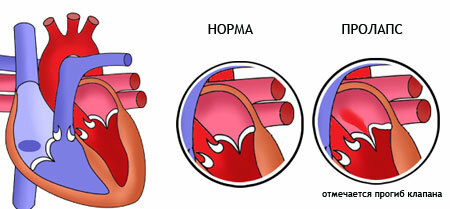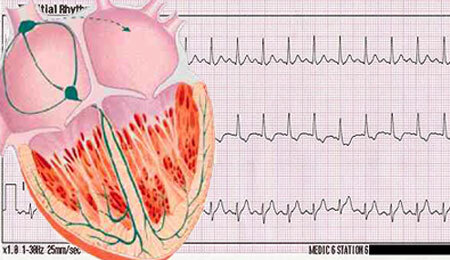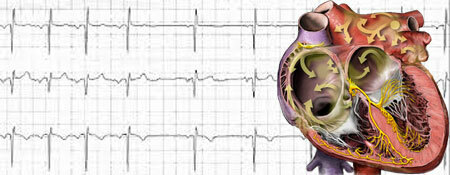What is it?
Sinus tachycardia of the heart is a disease that is a form of supraventricular tachyarrhythmia and is characterized by malfunctioning of the sinus node. The contraction of the heart muscle occurs more than 100 times per minute.
The length of the period when the heart rate increases, depends on the patient's well-being and the level of his activity.
Sinus node is a regulator of tempo, rhythm and heart rate. It is in it that the impulse is formed, which affects the functional of the muscle( myocardium).The excitation wave from the sinus node passes directly to the heart, embracing it completely, making the systoles and diastoles synchronous and, accordingly, repeating at regular intervals in time.
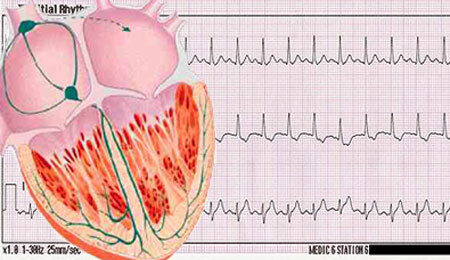
The onset of sinus tachycardia during a period of high levels of physical activity is considered a normal process. In addition, such an organism response is possible because of mental and emotional stress, excitement.
Among the daily habitual stimulants of sinus node activity, beverages with high caffeine content can be mentioned. In such cases, tachycardia should not cause concern - this type is called physiological.
- A truly dangerous disease becomes if a frequent pulse( namely 110-120 beats per minute) appears when you are at rest. There may be an increase in heart rate at night, when you are trying to fall asleep or in the early morning. In this situation, it is a question of pathological tachycardia, and it is not worthwhile to delay the visit to the cardiologist.
Depending on the degree of heart rate increase, the tachycardia is divided into 3 main varieties:
- Moderate - the pulse is accelerated no more than 20% of the patient's norm( the norm depends on the age and physical activity of the person, ie there are certain fluctuations in the allowable reference values);
- Average - the increase in heart rate is no more than 40% compared to the normative indices;
- Expressed, which is the most dangerous - the pulse rate increases by 60% or more.
Content
- 1 Sinus tachycardia in children
- 2 tachycardia in infants
- 3 Tachycardia in children from 3 years
- 4 Tachycardia adolescents
- 5 Sinus tachycardia during pregnancy
- 6 Symptoms of sinus tachycardia, diagnostics
- 7 treatment of sinus tachycardia, medications
- 7.1 Danger sinus tachycardia
Sinus tachycardia in children
If the adult diagnosis is more or less unequivocal: suspicions of tachycardia occur with increasing heart rate to 100-120 strokes, then what is sinus ta child's aikardia is less transparent because at an early age the normal pulse rate is significantly higher than in adults.
The younger the child, the higher the heart rate for it is acceptable. In newborn babies, an indicator not exceeding 160 beats per minute is considered acceptable. With each year of life the number is reduced by 10%.Thus, in a teenager of 13 years, the pulse should not exceed 110 beats.
In most cases, if there are no abnormalities in the work of the child's heart, sinus tachycardia will pass without medical intervention.
Sow panic ahead of time is not necessary, because the children's body is much more sensitive than an adult. Rapid palpitation can occur on the basis of any emotions: joy, irritation, sadness, pain, resentment, anger, and so on.
The device of the middle-aged person's mentality differs significantly from the child's: the child gives every emotion completely. If after 5-7 minutes after falling, screaming or laughing, the pulse stabilizes, then there is no reason for excitement. However, a cardiologist of children should still be shown to make sure that their development proceeds normally, and the baby has no problems with the cardiovascular system.
In a child under 10 years of age, palpitations may increase as the temperature rises, while in a stuffy environment and at altitude. If the pulse rates for 130-140 strokes are not accompanied by painful sensations in the heart region of any kind( tingling, sharp pain, pulling feeling) shortness of breath, tachycardia does not need treatment.
Tachycardia in newborns
Sinus tachycardia affects 45% of newborns. In 40% of them, the disease passes by itself and does not adversely affect the health of the heart in the future. An increase in heart rate is caused by excessive automaticity of the sinus node. If the increase in the heart rate is caused not by the pathological process, but by physiological changes, then the pulse will be rhythmic.
There are a number of dangerous factors associated with diseases of various body systems that can cause sinus tachycardia of the heart. These include:
- heart failure, inherited;
- myocarditis;
- acidosis( increased acidity of the internal environment of the body, leading to metabolic shifts);
- hypoglycaemia;
- anemia;
- central nervous system damage.
In the above cases, sinus tachycardia is an alarming symptom that allows you to suspect and identify a disease of the circulatory or neurological system.
In the case of heart failure, the reverse process is possible. If the tachycardia of a newborn is observed for a long period( 170 beats per minute during the day, the acquired heart failure may develop), which will affect the quality of life in the future.
- Similar seizures should be treated with pharmacological agents. The development of heart failure in this case is due to the inability of the kid's heart to adapt to excessive workload in the form of increased contractile activity.
Tachycardia in children from 3 years old
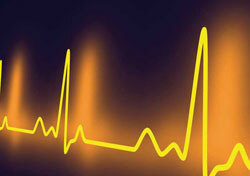 A child who went to a kindergarten or school may also have attacks of rapid heart rate. This is most likely caused by natural( heat, sudden change of pressure) or psychological causes.
A child who went to a kindergarten or school may also have attacks of rapid heart rate. This is most likely caused by natural( heat, sudden change of pressure) or psychological causes.
Some children are difficult to join the team or do not find a common language with teachers. In this case, it is necessary to talk with the child or buy sedatives, mostly of vegetable origin.
Tachycardia in adolescents
In adolescence, the hormonal background becomes unstable. There is accelerated growth and puberty. Musculature does not have time for progress in the growth of bone tissue. The heart muscle also needs additional nutrition to ensure normal growth.
It is difficult for the heart to provide "waste" of the body for prolonged physical activity, so it starts to beat more often. It is for this reason that teenagers often experience dizziness and "jumps" of blood pressure.
Another reason for the increase in heart rate is emotional feelings. At teenagers they deep enough as there is an accelerated mental growing up. Girls and boys are faced with a misunderstanding of society, the cruelty of the laws of society, which causes stress and moral exhaustion. Emotional well-being of a teenager largely depends on the behavior of parents towards him.
The hormonal background is almost completely rebuilt. Emissions of adrenaline that affect the automatism of the sinus node are permissible.
A teenager may experience uncomfortable pain in the region of the heart, chest heaviness or a pre-occlusive condition, but this does not pose a threat to the normal functioning of the heart.
Sinus tachycardia in pregnancy
Sinus tachycardia in pregnancy is a completely normal process, especially as regards the last trimester of gestation. This is due to the fact that one cardiac muscle works directly on two organisms.
With more than 95 strokes, the expectant mother needs to relax, calm down and temporarily stop physical activity. However, if these measures do not help, then you need to consult a gynecologist. If necessary, he will recommend an examination of the cardiologist.
Symptoms of sinus tachycardia, diagnosis
Symptoms of sinus tachycardia are not always unambiguous, and it is expressed equally for all age groups, except for newborns. The last category is distinguished by the fact that babies can not independently recognize unpleasant sensations and talk about them, therefore the responsibility for timely diagnosis completely falls on the shoulders of parents.
Clinical symptomatology:
- Heart palpitations - loud, rhythmic, rapid strokes "about the chest";
- Dizziness, which can intensify and cause loss of consciousness;
- Weakness in the limbs, loss of endurance, fatigue and fatigue;
- Insomnia, short-term sleep or frequent awakening;
- Decreased efficiency, loss of interest in familiar things, worsening mood;
- Severity in the chest, painful sensation within the intercostal space and in the back.
As a rule, each patient has a separate "clinical set" consisting of several symptoms.
Cardiologist examines the frequency of their occurrence and intensity. Looking for confirmation that in this case it is a question of pathological tachycardia. If tachycardia itself is a symptom of another disease, the patient is prescribed sedatives and treatment for a causative disease. Antiarrhythmic drugs are shown only as a symptomatic measure.
Diagnosis of sinus tachycardia is performed using electrocardiographic( ECG), echocardiographic( echocardiography), electrophysiographic( EFI) studies. MRI of the heart( magnetic resonance imaging) and EEG of the brain( electroencephalography) may also be prescribed.
A general blood test and hormonal tests are needed to ensure the consistency of the endocrine system. Thus, with tachycardia, a comprehensive examination is conducted, aimed at clarifying its degree and identifying the causative factor of this condition.
Treatment of sinus tachycardia, drugs
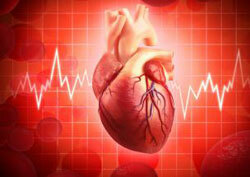 If an easy sinus tachycardia was diagnosed, treatment with medications will be minimal. Patients with this problem are advised to visit cardiology regularly: at least 2 times a year.
If an easy sinus tachycardia was diagnosed, treatment with medications will be minimal. Patients with this problem are advised to visit cardiology regularly: at least 2 times a year.
Preparations for a mild form of tachycardia are valerian, motherwort solution, soothing preparations with mint and melissa. Homeopathic remedies can be replaced or supplemented with the following drugs: seduxen, phenobarbital, neu rochel.
If the patient has frequent unpleasant symptoms that last longer than 15-20 minutes and interfere with the habitual way of life, the doctor prescribes stronger medications, such as: isoptin, atenolol. In the case of a pronounced heart failure as a consequence or cause of sinus tachycardia, the cardiologist prescribes glycoside or inhibitory drugs.
At the same time, it is recommended to observe a diet with the fewest components that stimulate the automatism of the sinus node.
Minimize or eliminate altogether the following products are recommended:
- spirits( in severe cases and low alcohol);
- chocolate with a cocoa content above 50%;
- caffeinated beverages: coffee, strong tea, energy;
- is heavy for digestion food.
Danger of sinus tachycardia
In the case of a physiological type of tachycardia, the prognosis is satisfactory( positive).If it is a pathological sinus tachycardia, it all depends on the individual symptomatology of the patient and the presence of acute heart disease.
The longest attacks of sinus tachycardia are most dangerous, which can cause acute left ventricular dysfunction and lead to arrhythmic shock. If you start the acquired heart failure, then other body systems can suffer. One of the consequences of severe pathological tachycardia is pulmonary edema, because of which breathing may stop.
Another body affected by tachycardia is the brain. Rapid reduction of the cardiac muscle leads to a weakening of the blood flow in the cerebral cortex. Clots can form, and even in the most neglected situations, even an ischemic stroke is possible.
To prevent unpleasant and fatal consequences of sinus tachycardia, it is recommended to visit the cardiologist regularly, monitor the diet and do some simple physical exercises on a daily basis. All this should be combined with the reception of medications recommended by the doctor.

